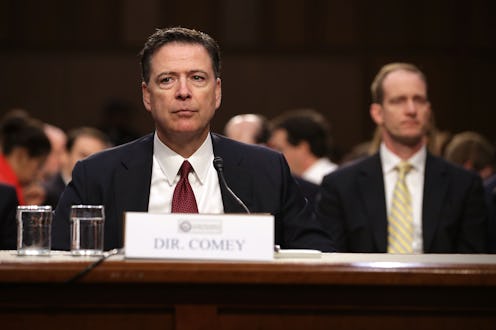News
How Bad Was James Comey's Testimony For Trump? Legal Experts Weigh In

In testimony before the Senate Select Committee on Intelligence on Thursday, former FBI Director James Comey reaffirmed what had been reported for weeks — that he believes the president of the United States allegedly leaned on him to minimize an investigation into his campaign and associates before firing him. Comey was clear that he saw president's actions as an attempt to block the investigation, and that he felt concern about what he felt were the president's actions jeopardizing the independence of the FBI. "There’s no doubt," he said. "I was fired because of the Russia investigation. The endeavor was to change the way [it] was being conducted.”
But despite the unambiguous nature of Comey's testimony, and what seems like clarity that the president acted in a way that violated precedent and norms about how the White House interacts with the Justice Department and FBI, experts still see a lot of ambiguity about how bad the revelations could be.
"Most everybody agrees that sitting presidents cannot be indicted. They're not subject to prosecution," Vikram Amar, Dean of the University of Illinois College of Law, tells Bustle. "You can be innocent of the technical legal crime of obstruction, but still be guilty of something that is impeachment worthy, or you could be guilty of the technical crime of obstruction but not be guilty of something that's impeachment worthy. They're different ideas. The 'high crimes and misdemeanors' standard in the Constitution doesn't track the criminal statutes that exist on the books."
Impeachment is, according to many experts, a political matter more than a legal one. Thus, whether a president's behavior warrants impeachment often depends not on strict legal definitions but on the public's view on whether the president's actions were proper. And, beyond simple concerns of partisanship that can cause many Trump's defenders to defend his actions, that question itself is not cut-and-dry.
"Technically, the president gets to decide who's investigated and who isn't," says Amar. He points to the difference between how the Justice Department under the Obama and Trump treat investigations of police misconduct. Though there has been a deliberate attempt to isolate many parts of the Justice Department from the White House since Watergate, those are norms usually followed, not necessarily law, Amar explains. "Ultimately, it's not what he did, but why he did it that should be the focus of these inquiries," he says.
In determining whether Trump committed obstruction of justice, it is not clear Comey's testimony will pack a punch either. Saikrishna Prakash, a Professor at University of Virginia Law School who studies executive powers, explains why it is so hard to demonstrate there has been obstruction of justice. He points to the "improper purpose" requirement for obstruction of justice cases, which could make evidence of illegal activity hard to find. "There's got to be a mental state," Prakash tells Bustle. "You're doing something for the wrong reasons."
As a result, Prakash explains, "It's very hard to prove obstruction of justice because of the mental state requirement. And I think what's going on is that if you think that Trump is a corrupt person you're going to be inclined to think that he had a corrupt purpose here. And if you don't have that view, then you're more skeptical of the claim that whatever he's done here is going to be motivated by a corrupt purpose."
Tim Naftali, former federal director of the Richard Nixon Presidential Library and now a an associate professor at New York University, draws a contrast between Trump's attempted intervention at the Justice Department and Richard Nixon's.
"President Nixon used intermediaries to put pressure on people," Naftali tells Bustle, referring partially to the "smoking gun" tape from the Watergate investigation wherein Nixon asked his chief of staff to tell the CIA to put pressure on the FBI to shut down investigations of the Watergate break in. "He rarely if ever did it himself. When he wanted to stop an investigation, he used subordinates, he used surrogates, he use cutouts. He didn't go directly to the FBI."
Thus, in the comparison between Watergate and this Russia scandal (we really need a better name for it don't we?), Trump was, in this respect, even more brazen than Nixon.
The bottom line is that there is still a lot to find out (or be revealed) before we can figure out how damning Comey's testimony was for the Trump administration. "We're in the early stages of a nine-inning game and we really don't know where it's going to go," says Prakash.